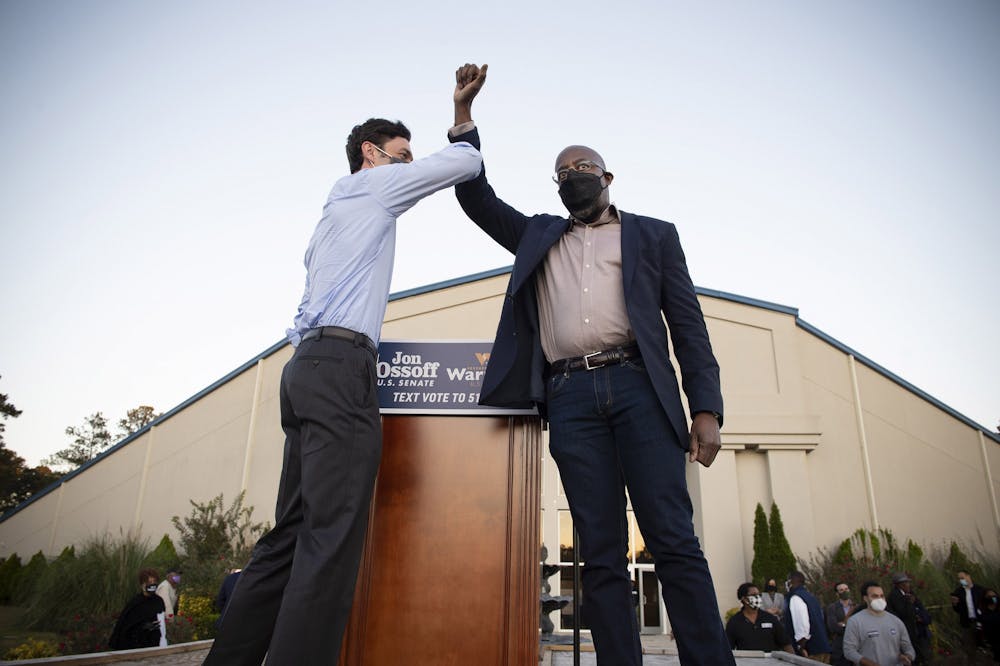On Jan. 5, Georgians will vote in a runoff election for both of their Senate representatives. The ballots cast will have ramifications for each of the additional 49 states, including Indiana. Across the aisle, there is consensus among Americans that little progress is being made in Washington, particularly in the Senate. This gridlock has been sustained throughout the COVID-19 pandemic, during which more than 6,200 Hoosiers have died. As Indiana faces another wave of cases, this lack of action from the Senate continues to drastically limit COVID-19 relief funding and jeopardize the Affordable Care Act during the worst pandemic in modern-day history.
The solution to the political gridlock obstructing the Senate from accomplishing any meaningful legislation to provide Hoosiers health care and economic aid may come down to just two Georgia Senate seats. Democratic candidates Reverend Raphael Warnock and Jon Ossoff, if elected, have both committed to protecting the ACA and passing the COVID-19 relief package. Meanwhile, Republican candidates David Perdue and Kelly Loeffler are expected to support efforts to overturn the ACA and have expressed little backing of any form of substantive COVID-19 relief.
The most recent iteration of the COVID-19 relief bill introduced in the Senate is the updated $2.4 trillion HEROES Act. This bill, passed more than 200 days ago by the House, promises to provide economic relief in the form of unemployment benefits, rental and mortgage assistance, hazard pay and another round of stimulus checks. Before it could even be brought to the Senate floor, Majority Leader Mitch McConnell said, “That’s not a place I think we’re willing to go.” This signals that Republicans are unwilling to negotiate a solution — with some suggesting that the bill should not be considered until January 2021.
Georgia runoffs will also determine whether Americans can turn to Congress to ensure continued health care support, especially if the ACA is struck down by the Supreme Court. In 2014, the ACA made it illegal for insurance plans to prevent those with preexisting conditions from obtaining insurance or from being charged higher rates for the same plan. Now, 1.1 million Hoosiers under the age of 65 with preexisting conditions, including more than 300,000 Hoosiers who find themselves newly labeled as having a preexisting condition due to a COVID-19 diagnosis, have their eyes turned to the fate of the ACA.
If the ACA is overturned, there will be devastating impacts on both health care and the economy. Indiana will be expected to lose 18,000 jobs and $1.6 billion in federal funds. As we are in the midst of a historic pandemic and economic recession, these losses will be devastating.
Every vote cast in Georgia will now determine whether 29.8 million Americans, including 566,000 Hoosiers, are able to acquire affordable health care, whether patients see their doctors for preventative care or find themselves on a ventilator a month later and whether COVID-19 patients with long-term complications will ever be able to get back on their feet.
McConnell and Senate Republicans have repeatedly expressed their unwillingness to pass a COVID-19 relief package, adding to the nearly 400 bills comprising the “legislative graveyard” guaranteed never to be heard on the congressional floor. As a direct result, already overcrowded hospitals across Indiana are peaking in number of hospitalizations, and at the dawn of flu season, COVID-19 patients occupy 43.1% of our state’s intensive care beds.
How many more Hoosiers will lose their homes, their jobs and their lives before the Senate manages to act? How much is too much to spend on the well-being of Americans? The balance of the Senate is now in the hands of Georgia voters. As long as the Senate remains under Republican-majority control, McConnell’s bill graveyard will continue to generate a true graveyard.
For more information: Fair Fight, a nonpartisan organization based in Georgia, is working hard to ensure all Georgians have access and ability to cast their votes. Americans from across the nation can join their efforts to protect the right to vote for all.
Lucy Brown, Kaylee Tutrow and Sigal Tavel are medical students in Indiana. They are executive board members of the Students for a National Health Program at their medical school.






